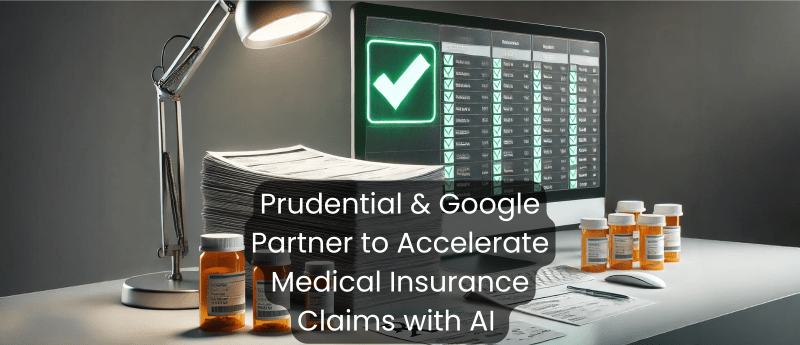Prudential and Google Cloud Launch Pioneering Partnership to Accelerate Medical Insurance Claims with AI

Medical insurance and financial company Prudential plc (London, UK) has announced a groundbreaking partnership with Google Cloud to make medical insurance claims “faster and more frictionless”. The British firm- focused on providing health and life insurance, will be using Google’s healthcare-focused AI to streamline claim-related paperwork and speed up approval and payout procedures.
Prudential’s Pioneering Initiative
Prudential will be one of the first insurance companies to use the Medical Language Model MedLM, which is Google’s group of foundational technology trained for healthcare use. MedLM reviews supporting documents provided with health insurance claims, including prescriptions, diagnostic findings and receipts.
This comes after Prudential undertook various “proof-of-concept” tests, which revealed that the implementation of MedLM enhanced the accuracy of claims determinations and increased the automation rate of their assessments, accelerating the entire claim management process.
According to Arjan Toor, CEO, Health at Prudential plc:
“Prudential’s early tests with MedLM demonstrate that generative AI can play a major role in efficiently tackling the growing volume of health insurance claims, resulting in more frictionless processing and a faster turnaround time for customers.”
Starting in Singapore and Malaysia, Prudential plans to use MedLM to choose medical insurance claims for a period of three to four months. Then, to determine its ability to enhance claim evaluation, the AI’s recommendations will be contrasted with decisions made using current industry procedures.
With this initiative, Prudential aims to increase the precision of insurance claim verdicts, enhance support for human decision-making and reduce the potential of manual errors while speeding up claim processing and maintaining accuracy.
“In a fragmented and often confusing healthcare landscape, data and AI are enabling us to provide care beyond coverage for our customers. Our strategic partnership with Google Cloud has given us a valuable first-mover advantage in adopting generative AI to improve the customer experience at an important moment of truth. This is just the first step in using generative AI to deliver seamless, digitally enabled healthcare experiences at every step of our customers’ health journey; from the point of diagnosis, through treatment, recovery and prevention.”
Arjan Toor, CEO, Health at Prudential plc.
Leveraging Google’s Tech Innovations
Google Cloud is a leading provider of an extensive range of public cloud computing services. The US tech giant has a range of AI infrastructure, developer, data, security, and collaboration tools created to help companies create, implement, and maintain online applications and services.
One of these technologies is MedLM, created specifically to answer medical questions, provide summaries and convert recordings of doctor-patient talks into draft medical notes to enhance healthcare experiences for doctors and patients.
Google released the MedLM model last December. The system was developed to address the challenged faced by previous models Med-PaLM and Med-PaLM2, which were less versatile and lacked refinements and additional features. While providing customized solutions and process efficiencies not specifically offered in the original Med-PaLM models, MedLM offers significantly enhanced contextual understanding, adaptability, documentation, summarization and scalability.
Google’s perspective on Prudential’s use of MedLM is that this technology could become a game-changer for enhancing modern healthcare procedures.
“Prudential has taken a truly innovative approach by adapting MedLM’s advanced healthcare and medical-specific capabilities to one of its core business processes. This collaboration exemplifies how our strategic partnership with Prudential can empower its workforce to drive confident decision-making, improve the overall experience for policy holders, and create meaningful innovation in healthcare and finance.”
Karan Bajwa, Vice President, Google Cloud in Asia Pacific.
Key Risks Ahead
According to Toor, Prudential’s innovative initiative is “just the first step in using Gen AI to deliver seamless, digitally enabled healthcare experiences at every step of our customers’ health journey, from the point of diagnosis, through treatment, recovery, and prevention.”
However, there is uncertainty surrounding the implementation of AI in contemporary medical settings. This hesitancy partly stems from the fact that AI is still being developed and explored, and this feeling of instability is exacerbated by the lack of clear regulations defining the ethical use of AI in healthcare.
Concerns include AI’s inability to develop empathetic responses to patients’ conditions, potential biases in AI-generated documentation, the possibility of patient data being used to train AI systems without their consent, and the controversial approval of these devices by regulatory institutions such as the FDA.
Therefore, to establish AI reliably within modern medicine and fully harness the potential of these promising tools, further research must focus on addressing all the issues mentioned above. This way, AI’s implementation in modern healthcare settings will not pose a threat but would instead enhance current human-driven medical practices.
